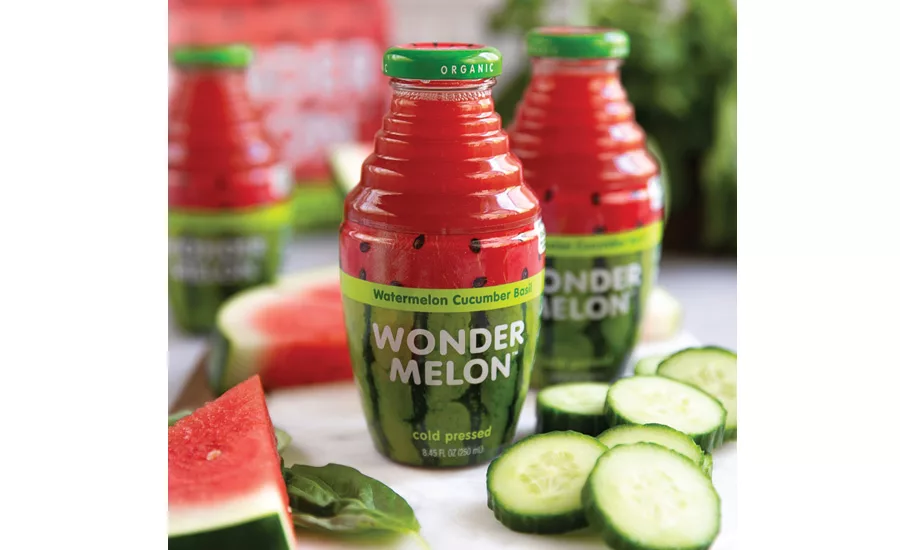Natural and organic beverages grow in prominence
Beverage-makers release new products with healthy properties

Naturally healthy and organic beverages continue to resonate in the market as more consumers take a hands-on approach to their own health and well-being. To keep up with clean-label trends, beverage-makers are releasing a wider array of options that deliver functional benefits in addition to refreshment.
According to a July Passport report from Chicago-based Euromonitor International, naturally healthy (NH) beverages contain a substance that improves health and well-being beyond a calorific value.
“These products are usually a healthier alternative within a certain sector/subsector,” the report states. “High fiber food (wholegrain/wholemeal/brown), soy products, sour milk drinks, nuts, seeds and trail mixes, honey, fruit and nut bars and olive oil are considered NH foods; and 100 percent fruit/vegetable juice, superfruit juice, natural mineral water, spring water, RTD green tea, etc., are considered NH beverages.
“While many of these products are marketed on a health basis, this might not always be the case,” the report continues. “Naturally healthy food and beverages that are additionally fortified fall into the ‘fortified/functional’ category.”
Defining organic
The Passport report explains that making a “certified organic” product involves a multistep production process that ensure product compliance.
“Certified organic products are those which have been produced, stored, processed, handled and marketed in accordance with precise technical specifications (standards) and certified as ‘organic’ by a certification body such as the Soil Association in the UK, the European Union or the U.S. Department of Agriculture,” it explains. “An organic label applies to the production process, ensuring that the product has been produced and processed in an ecologically sound manner. The organic label is therefore a production process claim as opposed to a product quality claim.”
Both natural beverages and organic beverages continue their upward trajectory in the beverage market. In 2013 and 2018, NH beverages generated sales of $18.7 billion and $19.7 billion, respectively, and had a compound annual growth rate (CAGR) of 5.5 percent, Euromonitor data states. Organic beverages saw a nearly 32 percent CAGR and reported dollar sales of $1.1 billion and $1.5 billion in 2013 and 2018, respectively, Euromonitor data reports.
Chicago-based SPINS also notes the accession and appeal of natural and organic beverages. In its “Functional and Enhanced Beverages” report, SPINS notes that “drinks now are doing more than ever to fuel our bodies and minds.” For instance, refrigerated juices and functional beverages, shelf-stable functional beverages and shelf-stable waters were up 5.9 percent across channels and generated sales of $27.2 billion over the past year.
The market research firm also highlights that certain segments specific to functional and enhanced beverages are outpacing topline growth. These top-performing segments include shelf-stable energy and other functional beverages, which saw sales of $3.3 billion, and are up 11.7 percent over the prior-year period; shelf-stable enhanced waters, up 12.8 percent, and sales of $2.2 billion; refrigerated kombucha and fermented beverages had sales of $699.8 million and an uptick of 15.7 percent; and refrigerated coconut and plant waters had a year-over-year increase of 10.1 percent and $60.7 million in sales.
Packing a punch
As consumers seek healthier, better-for-you options, beverage-makers are introducing new products aimed at giving them the healthy attributes they desire.
For instance, in July, Los Angeles-based Rooted Shots released its self-titled portable wellness shots in powder form. Each non-GMO, gluten, soy and dairy free packet contains 500 mg of vitamin C and organic superfoods that are designed to kick your immune system into high gear, the company says. The shots are available in three flavors: Orange Strawberry, Turmeric Orange Ginger Black Pepper and Ginger Lemon Cayenne Pepper.
In response to consumers’ thirst for natural beverages, Bayonne, N.J. based Kayco released its kosher-certified Wonder Melon. Made from 100 percent organic cold-pressed juice with no added sugar, artificial ingredients or artificial colorings, both varieties — Watermelon Cucumber Basil and Watermelon Lemon Cayenne — are non-GMO verified, certified Fair Trade, USDA organic and certified OU kosher, the company says.
A March “Organic Beverages in the US” report from Euromonitor notes that organic certification offers an advantage for the premium juice category.
Despite the decline in the overall juice category, organic fruit/vegetable juice continues to perform well. “As Americans become more aware of the growing processes as well as the types of certifications available for fruits and vegetables that can be used in the production of juice, they are increasingly opting for beverages made from organic sources rather than conventional ones,” the report states.
Private-label fruit and vegetable juice manufacturers also are releasing their own products with an organic certification, which in the past had only been pursued by premium juice-makers, the report adds.
In addition to organic juices, interest in brewed tea products with organic production methods is higher than in other beverage categories, according to the report. “As consumer knowledge about tea production methods increase over the forecast period, it can be expected that organic RTD tea will continue to benefit and post consistent growth,” the report states.
Behind bottled water and NH fruit/vegetable juice, tea constitutes the third most important category in naturally healthy beverages, states Euromonitor’s March “Naturally Healthy Beverages in the US” report.
The report also notes that naturally healthy products account for the majority growth of soft drinks and the category’s overall shift toward shorter ingredients’ lists.
“Within categories, products with a shorter and easier to understand list of ingredients are outperforming those with higher numbers of additives,” the report states. “For example, within RTD coffee, the strongest growth is occurring in the cold-brew category, which mainly consists of coffee and water.” BI
Looking for a reprint of this article?
From high-res PDFs to custom plaques, order your copy today!



